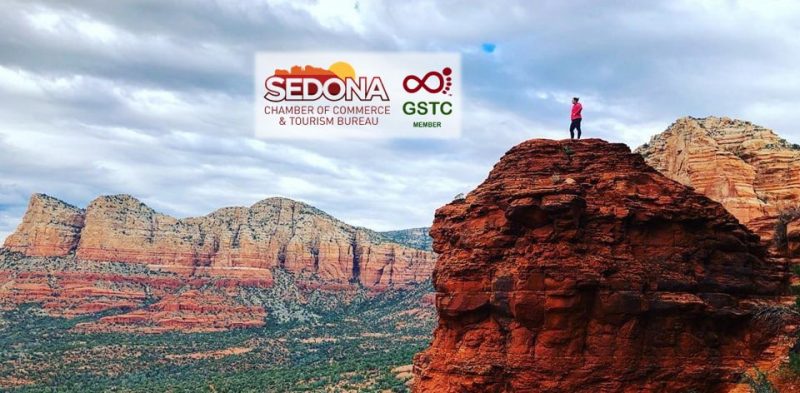Sedona Chamber of Commerce & Tourism Bureau (SCC&TB) has joined as a member of the Global Sustainable Tourism Council (GSTC).

Located in Arizona’s high desert under the southwestern rim of the Colorado Plateau, characterized by massive red-rocks, Sedona became known through the motion picture industry. Prior to the COVID-19 pandemic, the city attracted approximately 3 million tourists annually from around the world.
GSTC Destination Assessment of Sedona
In June 2016, Sedona went through a GSTC Destination Assessment which included meetings with public and private sector stakeholders and review of the sustainable tourism policy documents to identify gaps in the areas.
The GSTC then produced a report outlining the final results of the recommendations for improvements which the SCC&TB made public.
Following the GSTC Destination Assessment, Sedona put the GSTC Destination Criteria to use, applying key tactics to keep their resident and visitor experience top-notch while the population *doubles* daily from tourism – a $1B business for Sedona.
Sedona Sustainable Tourism Plan

United behind the Sedona Sustainable Tourism Plan that balances small-town quality of life, unique natural environment and bustling tourism economy, thousands of caring Sedonans embraced sustainable tourism in an extraordinary 18-month community conversation in 2018-19.
Visitors and locals contributed through surveys, intercept interviews, public meetings, online forums, and focus groups. Input from nonprofits, US Forest Service managers, government officials and business leaders rounded out the collaborative process.
Coordinated by the Sedona Chamber of Commerce & Tourism Bureau, the Sedona City Council, the Arizona State University Center for Sustainable Tourism and the Nichols Tourism Group, the Plan was unanimously approved by the Sedona City Council in March 2019.
Reaffirming Commitment to Sustainable Tourism
“Sustainable tourism is being embraced around the world with the adoption of the United Nations’ Sustainable Development Goals, 17 overarching global goals for sustainable development,” says Candace Carr Strauss, president & CEO of the Sedona Chamber of Commerce & Tourism Bureau. “Consumer choice of where to travel will be influenced by how destinations address them. Sedona, with the expertise of the GSTC is committed to doing so.”
GSTC Welcomes Sedona
“Sedona is a special place, and we at the GSTC are proud and pleased to provide any support we can to strengthen its journey to finding and applying ever more sustainable forms of tourism planning and activities,” says Randy Durband, CEO of the GSTC. “Applying the GSTC Criteria to a destination’s plans and practices means to take a holistic approach to sustainability, relating not just to environmental protections but also social, economic, and cultural aspects of the community and its visitor attractions.”
GSTC encourages destinations pursuing sustainability practices in development and management of tourism, to join as GSTC members and apply the GSTC Destination Criteria (which eventually can lead to achieving certification by a GSTC-Accredited Certification Body) and support local business to apply the GSTC Industry Criteria.





